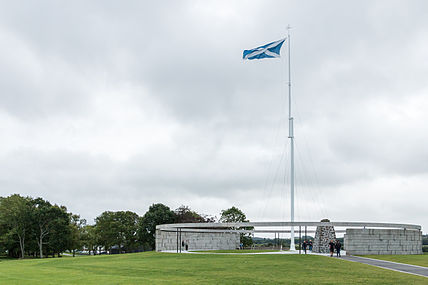 |
| Bannockburn memorial, Scotland. Source: Wikipedia |
On Midsummer's day in 1314, Robert the Bruce defeated the English at Bannockburn, not far from Stirling. It was a remarkable victory, not least because the Scots were outnumbered by as many as 4 to 1. The fighting actually lasted two days, with smaller scale skirmishes on the first day, and a pitched battle on the second. By the end of the second day, King Edward II had fled the field, followed by as many of his knights and nobles that could escape the confusion. The king barely escaped, pursued all the way to his ship by Sir James "the Black" Douglas, and while a few of his followers made it home, many more were captured or killed on the road. It was one of the most embarrassing defeats in medieval English history.
It was not, however, the end of the Scottish war of independence. Bannockburn's significance is more in its effects in Scotland. In 1314, the Scots were just coming out of decades of fighting over the royal succession. Robert Bruce was king, but many Scottish nobles still supported the Balliol family, whose claim to the throne had been judged to be stronger than that of the Bruce's grandfather (also called Robert) back in 1292. Victory at Bannockburn changed that. The Bruce showed the Scottish nobles that he was a strong enough leader to unite an army that came from all over Scotland, including the then independent kingdom of the Isles. If the force of Robert Bruce's personality could accomplish what several previous kings hadn't been able to do with an army, he was probably the right man for the job.
The other important effect of the victory at Bannockburn was that it removed the English army from Scottish soil. The fighting continued, but not in Scotland. After Bannockburn, the Scots were able to invade England, which gave them a distinct advantage. Now on the offensive, the Bruce invaded both England and English-occupied Ireland, eventually forcing the English to acknowledge his kingship and Scotland's independence, albeit grudgingly. In short, without this one victory in 1314, and the political work that followed it, including the Declaration of Arbroath (1320), Scotland almost certainly would not have remained independent until the Union of the Crowns in 1603.
So enjoy the solstice, but if you're Scottish at all, maybe have a dram around sunset in memory of those who fought for their country's independence 701 years ago today.